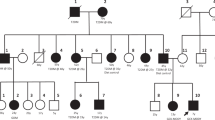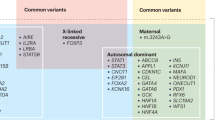Abstract
MATURITY-ONSET diabetes of the young (MODY) is a form of non-insulin-dependent (type 2) diabetes mellitus (NIDDM) which is characterized by an early age at onset and an autosomal dominant mode of inheritance1. Except for these features, the clinical characteristics of patients with MODY are similar to those with the more common late-onset form(s) of NIDDM. Previously2 we observed tight linkage between DNA polymorphisms in the glucokinase gene on the short arm of chromosome 7 and NIDDM in a cohort of sixteen French families having MODY. Glucokinase is an enzyme that catalyses the formation of glucose-6-phosphate from glucose and may be involved in the regulation of insulin secretion and integration of hepatic intermediary metabolism3. Because the glucokinase gene was a candidate for the site of the genetic lesion in these families, we scanned this gene for mutations. Here we report the identification of a nonsense mutation in the gene encoding glucokinase and its linkage with early-onset diabetes in one family. To our knowledge, this result is the first evidence implicating a mutation in a gene involved in glucose metabolism in the pathogenesis of NIDDM.
This is a preview of subscription content, access via your institution
Access options
Subscribe to this journal
Receive 51 print issues and online access
$199.00 per year
only $3.90 per issue
Buy this article
- Purchase on Springer Link
- Instant access to full article PDF
Prices may be subject to local taxes which are calculated during checkout
Similar content being viewed by others
References
Fajans, S. S. Diabetes/Metabol. Rev. 5, 579–606 (1989).
Froguel, Ph. et al. Nature 356, 162–164 (1992).
Matschinsky, F. M. Diabetes 39, 647–652 (1990).
Magnuson, M. A. Diabetes 39, 523–527 (1990).
Saiki, R. J. et al. Science 239, 487–491 (1988).
Orita, M., Iwahana, H., Kanazawa, H., Hayashi, K. & Sekiya, T. Proc. natn. Acad. Sci. U.S.A. 86, 2766–2770 (1989).
Orita, M., Suzuki, Y., Sekiya, T. & Hayashi, K. Genomics 5, 874–879 (1989).
Bell, G. I. et al. Proc. natn. Acad. Sci. U.S.A. 88, 1484–1488 (1991).
Lathrop, G. M., Lalouel, J. M., Julier, C. & Ott, J. Am. J. hum. Genet. 37, 482–498 (1985).
Holroyde, M. J. et al. Biochem. J. 153, 363–373 (1976).
Meglasson, M. D. & Matschinsky, F. M. Am. J. physiol. 246, E1–E13 (1984).
Lestradet, H. et al. Arch. Fr. Pediatr. 46, 19–23 (1989).
Author information
Authors and Affiliations
Rights and permissions
About this article
Cite this article
Vionnet, N., Stoffel, M., Takeda, J. et al. Nonsense mutation in the glucokinase gene causes early-onset non-insulin-dependent diabetes mellitus. Nature 356, 721–722 (1992). https://doi.org/10.1038/356721a0
Received:
Accepted:
Issue Date:
DOI: https://doi.org/10.1038/356721a0
This article is cited by
-
Monogenic diabetes
Nature Reviews Disease Primers (2023)
-
A multigenerational study on phenotypic consequences of the most common causal variant of HNF1A-MODY
Diabetologia (2022)
-
Metabolism-secretion coupling in glucose-stimulated insulin secretion
Diabetology International (2022)
-
Analysis of rare genetic variation underlying cardiometabolic diseases and traits among 200,000 individuals in the UK Biobank
Nature Genetics (2022)
-
Nicht immer Typ 1 – seltene Diabetesformen bei Kindern
Monatsschrift Kinderheilkunde (2021)
Comments
By submitting a comment you agree to abide by our Terms and Community Guidelines. If you find something abusive or that does not comply with our terms or guidelines please flag it as inappropriate.



